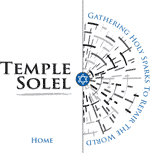Hanukkah is upon us! For all of the general Hanukkah information you could ever want or need, click here for my 2009 Hanukkah blog posting.
This year...I've been thinking about the Hanukkah story. You might remember that the story begins with the evil Antiochus IV (of the "Syrian-Greeks") who is looking to violently foist Hellenism on the Jewish residents of the Land of Israel around 168 BCE.
What is Hellenism? Try here for one answer. But my simplified response is that Hellenism was the values, beliefs, and culture of Ancient Greece. Antiochus, a proud Greek himself, wanted to replicate those values amongst other peoples as well.
The aspect of Hellenism that I want to focus on this week is the one associated with physical beauty. The Greeks, conscious of aesthetics, sought out people and things that were physically beautiful, and celebrated them. Greek mathematics was partially organized around the belief that things that were symmetrical were beautiful...or perfect. This influenced Greek architecture, and art...and even the way that people perceived themselves. And although every culture has always offered up its own definition of what constitutes physical beauty, there is little question that our society's own ideas about beauty can be traced right on back to ancient Greece.
Beyond the question of what constitutes American beauty today, I find it fascinating that - like the Greeks - we put so much IMPORTANCE on the physical appearance of ourselves and others.
I don't know if you heard about it...but there was an extraordinary survey published this week about this subject...and according to the survey, 32% of Americans believe that they themselves are stunningly beautiful - giving themselves an 8,9, or 10 on a scale of 1-10!
32%! Am I the only one that thinks that number is absurdly high?
But here's the best part: we Americans don't just think that we ourselves are beautiful. We have also deluded ourselves into thinking that we are far more beautiful than everyone else!
I say all of this by way of introduction to this week's Torah portion, Parshat Vayeishev. It's the beginning of the Joseph epic (his story takes up all of the rest of the Book of Genesis!). And, curiously, this week's Torah portion contains the following (unexpected!) description of our famous ancestor: "Joseph was well built and good looking" (Genesis 39:6). How bizarre! The Torah does not usually describe our ancestors (especially men) in those kinds of terms.
Interestingly, the history of commentary on this verse sheds light on the Jewish approach to beauty - which, as we might expect given the Maccabean revolt against Hellenism - is notably different from the Greek one.
Rashi (c. 1100 France) criticizes Joseph for spending too much time at the ancient Egyptian version of the spa, especially while he knows that his father Jacob sits at home - inconsolable because he mistakenly believes that Joseph is dead. Rashi notes that the Torah's statement about Joseph's beauty comes right before Mrs. Potiphar (wife of Joseph's boss) attempts to seduce him. Rashi suggests that the attempted seduction is God's way of punishing Joseph for being too vain.
Rabbi Samson Raphael Hirsch, of 19th century Germany, reads the text differently. The vanity suggested in the Torah itself is so preposterous to Hirsch that he cannot acknowledge that Joseph's looks had anything to do with Mrs. Potiphar's attraction to him. Instead, Hirsch insists that Joseph's "splendid spiritual attainments" far outshone his beauty....and those 'attainments' were the catalyst for the attempted seduction.
Whether you agree with Rashi or with Hirsch...our tradition is clear: a value judgement is being made against vanity and the preoccupation with one's own personal physical appearance. There is a danger, Judaism believes, in concentrating too much on the outside. If we do so, we make ourselves vulnerable to spoiling the beautiful sparks of our souls that rest within us.
As you gather around the menorah in the coming days, and admire the beauty of the lights....consider this week's Torah portion as well....and be reminded of the pitfalls of physical beauty. Contrary to the ancient Greeks, we Jews believe that our inner selves are always more precious and beautiful than our outer ones.
Happy Hanukkah and Shabbat Shalom,
Rabbi Brown
Subscribe to:
Post Comments (Atom)





No comments:
Post a Comment